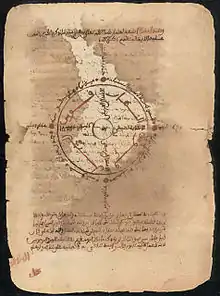Mamma Haidara Commemorative Library
The Mamma Haidara Commemorative Library is a private manuscript library in Timbuktu, Mali. Founded by Abdul Kader Haidara and named in honor of his father, the library preserves one of the oldest and largest private manuscript collections in Timbuktu, with about 22,000 items.[1][2]

History
The library houses a collection founded in the 16th century by Mohamed El Mawlud. After the sack of Timbuktu by Moroccan soldiers in 1591, El Mawlud's descendants in the Haidara family kept their manuscripts in relative safety within the family home, as did other scholarly households in Timbuktu.[3]
During the 20th century, Mamma Haidara collected other Malian manuscripts and bought manuscripts in Egypt and Sudan. By the time of his death in 1981, Mamma Haidara had built cooperative relationships with other manuscript libraries to promote research and the conservation and exchange of old documents.[1]
Abdul Kader Haidara worked for a time at the Ahmed Baba Institute in Timbuktu. After his father's death he organized his family's library as the Mamma Haidara Commemorative Library. He also began cataloging the library with support from the al-Furqan Heritage Foundation in London.[1]
Beginning in 2008, some manuscripts from the library were digitized with the aid of funds from the Ford Foundation. Haidara traveled to New York in 2009, where manuscripts from his library were exhibited at the Metropolitan Museum of Art.[4]
In 2010, the Library of Congress in Washington, D.C. included manuscripts from the Mamma Haidara Commemorative Library in a web exhibit, "Ancient Manuscripts from the Desert Libraries of Timbuktu."[5]
In November 2012, as Tuareg rebels threatened to occupy Timbuktu, Abdul Kader Haidara moved more than 15,000 of the library's manuscripts to Bamako for safekeeping.[6][7]
See also
References
- HUMA: Institute for Humanities in Africa. "The Mamma Haidara Memorial Library". Tombouctou Manuscripts Project. Retrieved May 25, 2013.
- Gwin, Peter (January 2011). "The telltale scribes of Timbuktu". National Geographic Magazine. Retrieved May 25, 2013.
- Larson, Marisa; Krieger, Emily (October 2007). "Page protectors". National Geographic Magazine. Retrieved May 25, 2013.
- Robert Goldwater Library (May 7, 2009). "Manuscripts of Timbuktu: selected resources". The Robert Goldwater Library Online Resource. Retrieved May 25, 2013.
- Library of Congress (July 27, 2010). "Exhibition Overview: Ancient Manuscripts from the Desert Libraries of Timbuktu". Retrieved May 25, 2013.
- Zanganeh, Lila Azam (January 29, 2013). "Has the great library of Timbuktu been lost?". The New Yorker. Retrieved May 25, 2013.
- Hammer, Joshua (2016). The Bad-Ass Librarians of Timbuktu. New York: Simon & Schuster. ISBN 9781476777405.